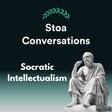
Wrestling with Stoic Ethics: Cicero's On Ends V (Episode 183)
In this final exploration of Cicero's "On Ends," Michael and Caleb break down Book V, where Cicero reveals his own philosophical sweet spot – an Aristotelian-Platonic approach that challenges both Stoicism and Epicureanism.
Against a backdrop of ancient Athens, Cicero's characters debate the core question: What makes a truly good human life? They navigate the middle path between Stoic rigidity (where virtue alone brings happiness) and Aristotle's elitism (where external goods are required).
(01:53) Awesome Beginning
(07:10) What's Our Purpose?
(26:09) Supreme Happiness
(31:55) Cicero's Objection
(40:39) Summary
***
Subscribe to The Stoa Letter for weekly meditations, actions, and links to the best Stoic resources: www.stoaletter.com/subscribe
Download the Stoa app (it’s a free download): https://stoameditation.com/pod
If you try the Stoa app and find it useful, but truly cannot afford it, email us and we'll set you up with a free account.
Listen to more episodes and learn more here: https://stoameditation.com/blog/stoa-conversations/
Check out our Youtube: https://www.youtube.com/@stoaphilosophy
Thanks to Michael Levy for graciously letting us use his music in the conversations: https://ancientlyre.com/



















